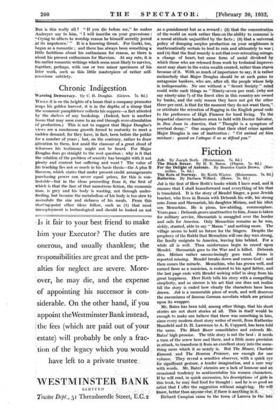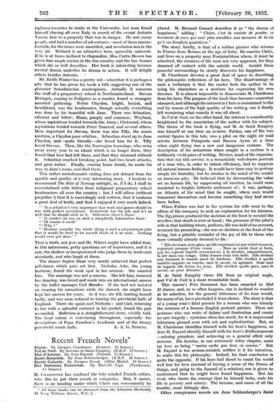Fiction
The Black Boxer. By H. E. Bates. (Pharos. 7s. 6d.)
Job is the first of Herr Roth's books which I have read, and it ensures that I shall henceforward read everything of his that is translated. It is the story of Mendel Singer, a poor Jewish teacher, who lives in Russia with Deborah his wife, his strong soils Jonas and Shemariah, his daughter Miriam, and his idiot son Menuchim. He is pious, law-abiding, commonplace. Years pass : Deborah grows unattractive to him, Jonas is taken for military service, Shemariah is smuggled over the border and sails for America. Only Menuchim remains as he was, sickly, stunted, able to say " Mama " and nothing more. The village seems to hold no future for the Singers. Despite the prophecy of the Rabbi that Menuchim will one day wax strong, the family emigrate to America, leaving him behind. For a' while all is well. Then misfortunes begin to crowd upon' Mendel. Shemariah goes to the War and is killed. Deborah dies. Miriam rather unconvincingly goes mad. Jonas is reported missing. Mendel breaks down and curses God : and then comes the miracle. Menuchim, who has grown well, and earned fame as a musician, is restored to his aged father, and the last page ends with Mendel seeking relief in sleep from his great happiness. Herr Roth tells his story with a compelling simplicity,- and so 'sincere is his art that one does not realize till the story is ended how clearly the characters have been diawn. Job is a memorable piece of work, and well deserves the encomiums of famous German novelists which are printed
upon its wrapper.
Mr. Bates has been told, among other things, that his short stories are not short stories at all. This in itself would be enough to make one believe that there was something in him, since every modern short story writer of merit, from Katherine Mansfield and D. H. Lawrence to A. E. Coppard, has been told the same. The Black Boxer consolidates and extends Mr. Bates' high promise. The title story is not the best : it needs a turn of the screw here and there, and a little more precision in attack, to transform it from an excellent story into the some- thing more which it so nearly is. But The Mower, Charlotte Esmond,' and The' Hessian Prisoner, are enough for one volume. They reveal a sensitive observer, with a quick eye for significant, gesture, a tender imagination, and a sure way with words. Mr. Bates' enemies are a lack of humour and an occasional tendency to sentimentalize his women characters. If he will read, in quick succession, his descriptions of girls in this book, he may find food for thought : and he is so good an :artist that I offer the suggestion without misgiving. He will - ithfist, better than anyone else, if there is anything in it
Richard Campion came to the town LI Larova in the late eighteen-twenties to study at the University, but soon found himself chasing all over Italy in search of the errant Antonio Vareni, heir to a property that was in danger. He met many people, and had a number of adventures—most of them uncom- fortable, for the times were unsettled, and revolution was in the very air. Richard is an attractive hero, agreeably unheroic. If he is at times inclined to rhapsodize, Miss Curtis Brown has given him ample excuse in the fine country and the fine houses which she so well describes. Her book is interesting because mental drama underlies its drama in action. It will delight others besides Antonio.
Mr. Keith Winter has a pretty wit—wherefore it is perhaps a pity that he has given his book a title suggesting- one of the gloomier Scandinavian masterpieces. Actually it concerns the staff of a preparatory school in Northumberland. Stevan Beringer, coming to Fallgates as a master, found a strangely assorted gathering. Robin Claydon, bright, boyish, and bewildered, was the headmaster, though actually everything was done by his beautiful wife Jane. There was Sebastian, efficient and bitter ; Mann, pimply and common ; Weyland, whose aspirations tended towards the Army ; Chetwood, whose aspirations tended towards Peter Tancred, and several others. More important for Stevan, there was also Tilly, the music mistress, a Claydon poor relation. Sebastian stood up to Jane Claydon, and—quite literally—she loved him for it. Tilly loved Stevan. Then, like the Norwegian lemmings, who swim away every year to an island which is no longer there, they found that love had left them, and that they drowned without it. Sebastian reached breaking point, had two heart attacks, and gave faotice. Finally, coming home drunk, he made his way to Jane's room, and died there.
This rather melodramatic ending does not detract from the sparkle and quality of a very interesting story. I hesitate to recommend The Rats of Norway outright, as, if I do, I shall be overwhelmed with letters from indignant preparatory school headmasters all over the country ; but I will affirm (without prejudice !) that it is exceedingly well written, that it contains a great deal of truth, and that I enjoyed it very much indeed.
" ' In a school it's very important that work and games should be
run with perfect mechanism. Everybody has his job, and it's as well that he should stick to it. Otherwise there's chaos.'
" It needn't be run on such a completely humourless basis.' " Of course it need.'
" Why / ' " ' Because actually the whole thing is such a preposterous joke that it would be fatal to let oneself think of it as such. Nothing would over get done.' "
That is truth, not jest: and Mr. Winter might have added that, in this microcosm, petty questions are of importance, and it is only the shallow or inexperienced who judge them by irrelevant standards, and who laugh at them.
The dancer Sophie Dane very nearly achieved that perfect selfishness which puts art first. Nicholas Ashe, the young baritone, found the weak spot in her armour. She married him. The marriage was not a success. She left him, resumed her dancing, was loved and made into an international success by the ballet manager Carl blander. If she had not insisted On wearing his carnations while she danced, she might have kept her success for years. As it was, she fell, hurting herself badly, and was soon reduced to touring the provincial halls of England. There she again met Nicholas : and Carl, returning to her with a splendid contract in his 'pocket, found the pair reconciled. Ballerina is a straightforward story, vividly told. The local colour is convincing throughout, especially the descriptions of Papa Fanchon's Academie and of the dreary







































 Previous page
Previous page